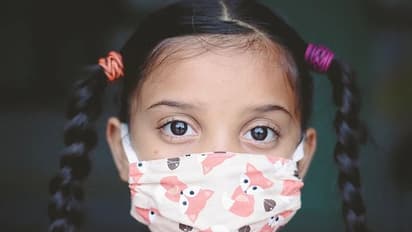Explained: How to take care of children with Covid-19 symptoms?

Synopsis
Following guidelines for early detection and proper management can boost the chances of a speedy recovery of children infected with Coronavirus.
One of the most significant differences noticed across the country when comparing the two waves of the Coronavirus pandemic was the number of children infected by the virus.
To address parents' concerns, the Union Health Ministry has framed important guidelines to identify, distinguish and treat a child infected with Covid-19.
According to Health Minister Dr Harsh Vardhan, early detection & proper management can boost the chances of a speedy recovery. He shared a few guidelines and urged people to adhere to some simple guidelines on treating asymptomatic cases or cases with mild symptoms at home.
How to identify the virus in children?
As per the health ministry, an asymptomatic child is usually identified while screening if other family members are identified. In such a case, the child would require monitoring to develop symptoms and subsequent treatment according to assessed severity.
Mild Cases
The child with mild cases may have symptoms like sore throat and cough with no breathing difficulty. Some children may show gastrointestinal symptoms. They don't need any investigation.
Children who are asymptomatic or have mild Covid-19 infection can be managed with home isolation and symptomatic treatment, including those with underlying comorbid conditions like congenital heart disease, chronic lung disease, chronic organ dysfunction and obesity. However, one must always consult the doctor.
Mild Cases Treatment
In case of mild symptoms, it is unnecessary to rush for a bed in the hospital. Home isolation is best for treating both asymptomatic and mild Covid-19 patients, including children. Oral fluids to remain hydrated and a nutritious diet must be ensured.
Paracetamol 10-15 mg/kg/dose may be given for fever. This may be repeated every 4-6 hours.
Throat soothing practices like warm saline gargles in older children and adolescents may be given for cough.
Note: Drugs like lopinavir, ritonavir, hydroxychloroquine, favipiravir, ivermectin, remdesivir, umifenovir, immunomodulators, including Tocilizumab, Interferon B 1 a, Convalescent plasma infusion or dexamethasone have no role.
Parents or caregivers can maintain a monitoring chart for counting respiratory rates twice or thrice a day. Check for chest indrawing, blueish discolouration of body, cold extremities, urine output, oxygen saturation via pulse oximeter, fluid intake and activity level, especially for young children. Besides, constantly update your doctor and stay connected.
Moderate Cases: A child should be categorized as moderate Covid-19 Case if he/she has the following:
Rapid Respiration (Age-based) as follows:
Respiratory rate >60/ min for less than two months
Respiratory rate >50/min for less than 2 to 12 months
Respiratory rate >40/min for 1 to 5 years
Respiratory rate >30/min for more than five years
Note: Oxygen saturation in all these age groups to be above 90%. The child may be suffering from pneumonia which may not be clinically apparent.
Treatment: For investigation, no lab tests are needed unless indicated by associated comorbid conditions.
Children with moderate Covid-19 disease must be admitted to a dedicated Covid Health Centre or Secondary level Healthcare Facility and monitored for clinical progress.
Always ensure to maintain fluid and electrolyte balance in the body. Encourage oral feeds (breastfeeds in infants). If oral intake is inadequate, intravenous fluid therapy should be initiated.
Children with moderate Covid-19 diseases can be given (only after consulting a doctor) Paracetamol 10-15 mg/kg/dose for fever. The dose may be repeated every 4-6 hours. (temperature > 38oC, i.e. 100.4oF).
With inputs from Prasar Bharati News Service
NOTE: Asianet News humbly requests everyone to wear masks, sanitize, maintain social distancing and get vaccinated as soon as eligible. Together we can and will break the chain #ANCares #IndiaFightsCorona